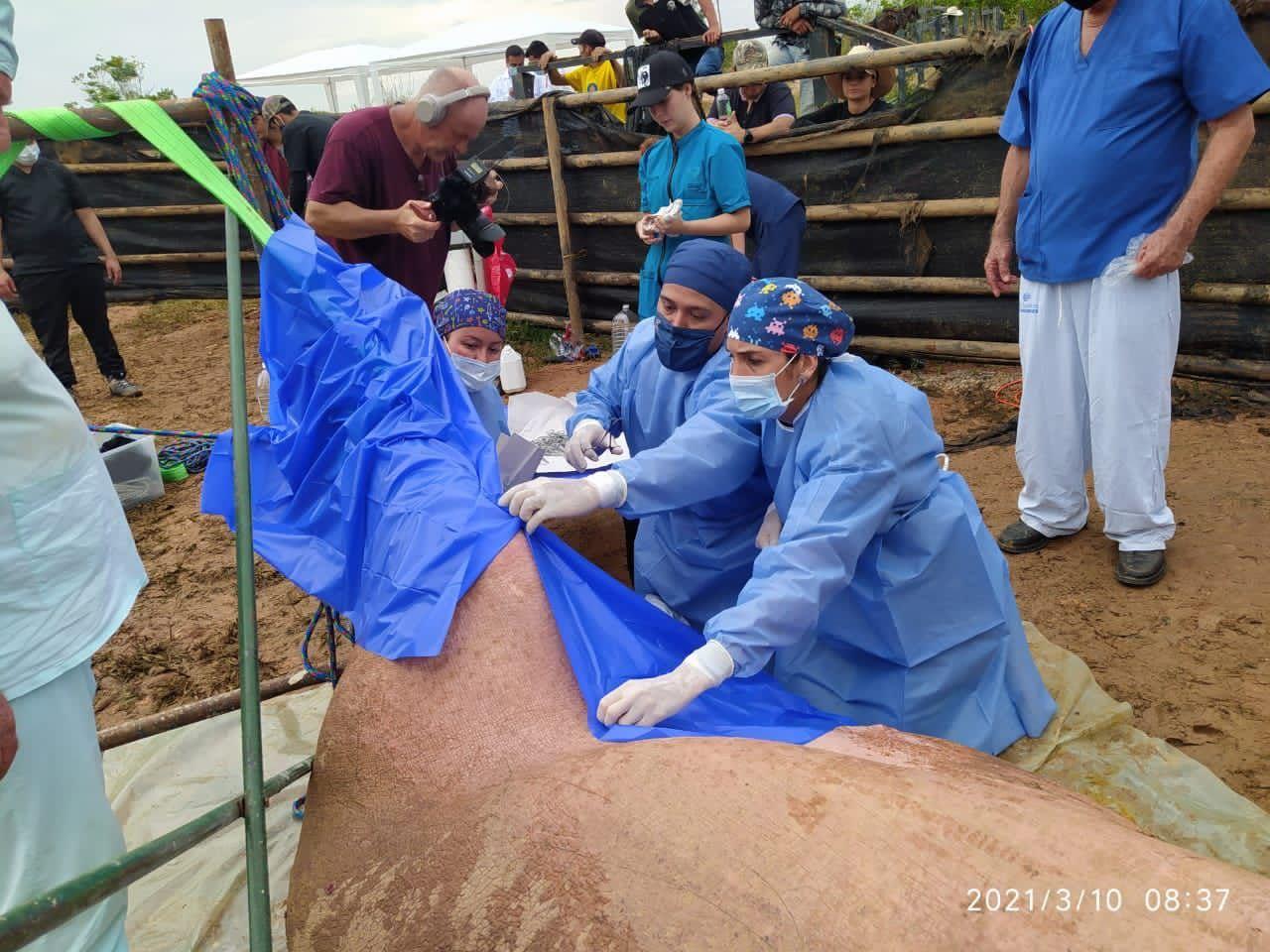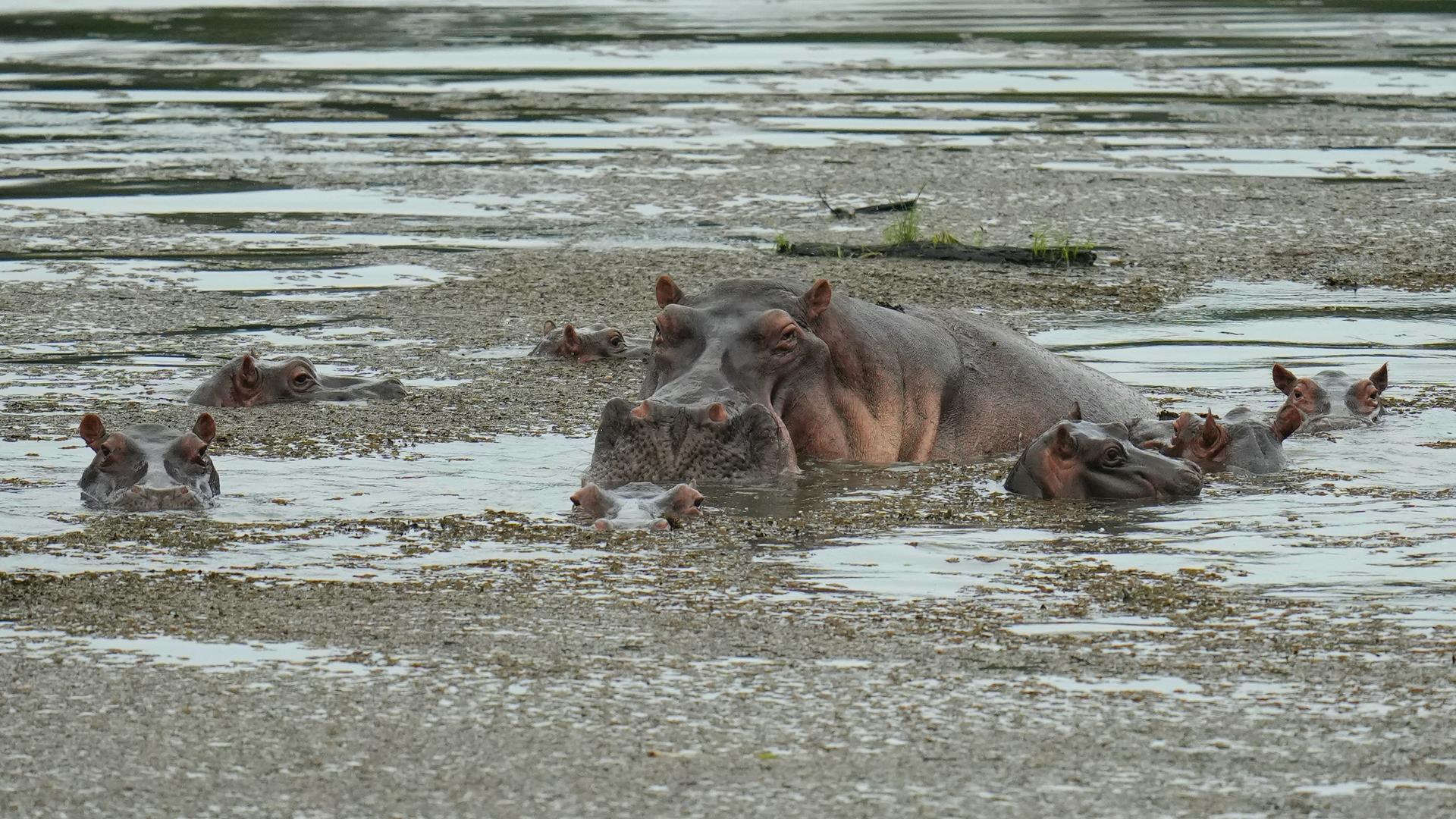Colombia to declare hippos an invasive species
Nearly 30 years after the drug kingpin Pablo Escobar was gunned down, Colombia is still dealing with an unusual part of his legacy: hippos.
Back in 1981, Escobar built a private zoo in his massive estate located 124 miles north of Bogotá. He smuggled in exotic animals from Africa, including zebras, rhinos, giraffes and a few hippos.
Related: For developing countries, the war in Ukraine means even higher food prices
After Escobar’s death, most of the animals were transferred to local zoos or local captivity facilities, according to Nataly Castelblanco, a marine biologist who is studying the impact of hippos on Colombia’s ecosystem.
But the Colombian government couldn’t figure out what to do with the hippos, she said. Hippos are costly to transport, and amid violence in the area at the time, they were left to wander free in the wetlands surrounding the Magdalena River, she said.
With nice warm weather and no predators, the animals have flourished. According to the most recent census conducted last year by the Alexander Von Humboldt Biological Research Institute, there are now 133 of these animals in an area of about 200 square miles.
But hippos are seen as a threat to people and the environment. For decades, local scientists have been calling on the government to make the unpopular decision of culling the population before it expands to other regions.
The Colombian Environment Secretary Carlos Eduardo Correa announced in February that, within weeks, he would sign a resolution to declare hippopotamuses an invasive species. It means that the government would get a green light to consider castration, sterilization and euthanasia, Correa said.
“It is the right move. Hippos spend most of their time in the water where they defecate and urinate, and that is causing the displacement and even extinction of many species native to Colombia.”
“It is the right move,” marine biologist Castelblanco said. “Hippos spend most of their time in the water where they defecate and urinate, and that is causing the displacement and even extinction of many species native to Colombia.”
Castelblanco also said that hippos can be dangerous. Despite being herbivores, they cause more deaths in Africa than lions and crocodiles together, she said. In Colombia, they have not yet caused any deaths, but have occasionally attacked people.
Luis Enrique Díaz, a farmer who lives in the area, told reporters about his unfortunate encounter with a hippo two years ago. In a video posted by a local news agency, Diaz said the animal attacked him from behind and permanently injured his leg and back.

In spite of the threats, the idea of sacrificing hippos is highly unpopular among locals, according to David Echeverri, a biologist who oversees and takes care of the animals in the field.
Echeverri said that many residents of Puerto Triunfo, where Escobar used to live, consider hippos as part of the community.
“They are seen as charismatic animals. They are chubby, their babies are cute; so, many people who grew up in the area are used to them and love them,” he said.
Magdalena Torres has for 20 years lived in front of a pond where hippos bathe. She said that nobody in town wants to see these animals killed.
“It would be unfair to them, it’s not their fault,” she said.
“Hippos are now Colombians.”
Torres said that she believes “hippos are now Colombians.”
The animals also play an important role in the local economy of Puerto Triunfo. Escobar’s land was turned into a theme park that attracts thousands of tourists from all over the world. And the hippos are one of the main attractions.
But hippos are colonizing areas as far as 124 miles from Puerto Triunfo, where people are not as familiar or happy with them, said María Piedad Baptiste, a researcher with the Alexander Von Humboldt Biological Research Institute.
“The perception of the animal is different depending on the region,” she said. “The farther they are from the city, the less acceptance they have.”
Baptiste explained that in rural areas, the animals are impacting important economic activities such as fishing or harvesting.
In 2007, complaints of damaged crops prompted authorities to consider killing them for the first time, according to biologist Echeverri. They decided to sacrifice a male called Pepe, who had killed six pigs and attacked several fishermen.
But a photo of the soldiers who escorted the German hunter who sacrificed Pepe unleashed the anger of several animal rights groups that protested in front of the Ministry of the Environment and demanded the dismissal of all of those involved in the decision.
The controversy led the ministry to suspend the hunt for hippos and in 2012, a court prohibited it.
Since then, politicians have avoided the difficult decision of culling the animals, because it might have political costs, said Sebastián Restrepo, a professor of environmental and rural studies at University Javeriana in Bogotá.
“The topic is on the agenda of politicians running for municipal and national offices in May. Many of them are taking radical positions that are concerning to scientists because in the end, it is a clear case of animalistic populism.”
“The topic is on the agenda of politicians running for municipal and national offices in May,” Restrepo said. “Many of them are taking radical positions that are concerning to scientists because in the end, it is a clear case of animalistic populism.”
In the middle of the debate, the option to sterilize the animals was thought to be a less radical solution. The procedure has been done a few times and it is “complicated, lengthy, expensive and dangerous,” biologist Echeverri said.
He explained that they have to inject a potent sedative before it’s safe to approach hippos. Then, these very heavy animals need to be transported to a designated area where they conduct the sterilization with a specialized team of veterinarians. It costs approximately $10,000 for each, according to Echeverri.
A more recent option that is being tested is birth control — 24 hippos have been given an immunocontraceptive vaccine called Gonacon, donated by the US Department of Agriculture. But the effect of the drug only lasts nine months.
Related: Former FARC rebels reimagine peace with this new cultural gathering space in Colombia
Echeverri and other advocates are asking zoos around the world to take in the Colombian hippos — and pay for the logistics to transport them.
But marine biologist Castelblanco said that hippos live for up to 50 years, so even if they are sterile, they will keep damaging the environment. For her, the only option is to eradicate the species from Colombia.
“I think we have to talk here about euthanasia conducted by professionals, by veterinarians seeking to minimize animal pain and suffering as much as possible.”
She said that Colombia is facing a choice: either preserve the hippos or the environment.
And with so few resources, Colombia may finally opt for the environment.
The government has not made an official announcement yet about what comes next.
